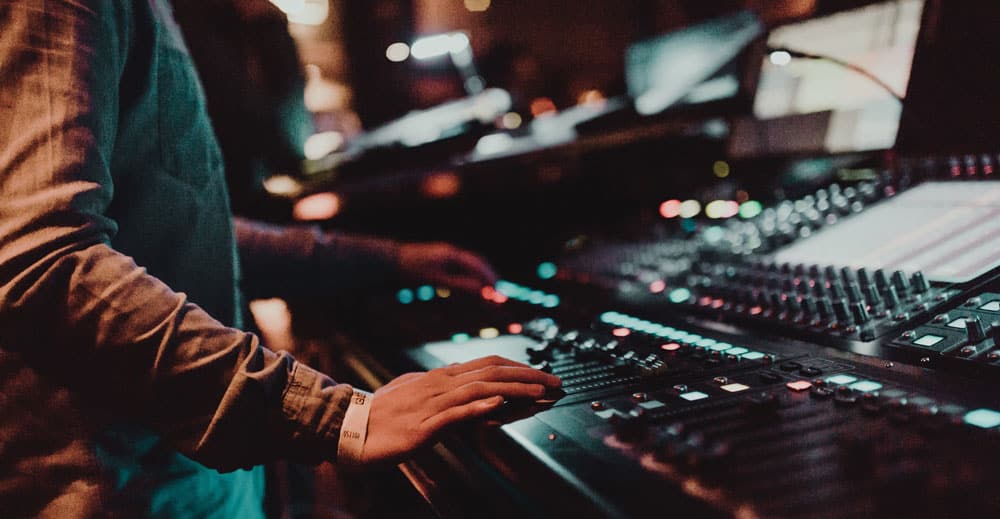Thinking about a career in music might feel like standing at a crossroads, each path winding toward an uncertain future.
A swirl of questions come to mind.
"Will investing years and hard-earned dollars into honing your craft at school pay off?"
"How much will it cost?"
"What jobs are out there for me?"
Or even, "Do I really need this degree to make my mark?"
I've been there, I know a lot of people in the business, and it's not an easy answer. Let’s discover if pursuing a music degree is what you need for your future success in the industry.
What Does a Music Degree Program Give You?
Now when you're considering whether or not to go down the music degree path, it's crucial that you fully understand what this choice entails.
Types of Music Degrees
There are several kinds of degrees in music.
| Degree Type | Summary | |
|---|---|---|
| Certificate in Music | Focused training and certificate to get a deeper understanding of a single topic. | Less than a year |
| Associate Degree | Similar to a certificate, but often designed to make transferring to a higher Bachelor's degree easy. | 2 years |
| Bachelor of Music (BM) | The most common type of music degree, focusing on performance, composition, and theory. Ideal for those passionate about music and seeking a strong foundation in the craft, on their journey to becoming a professional musician. | 3-4 years |
| Bachelor of Arts (BA) | A generalized degree, offering a well-rounded education in music history, theory, and composition. Perfect for those seeking a well-rounded education and flexibility in their career pursuits. | 3-4 years |
| Bachelor of Fine Arts (BFA) | A deeper exploration into performance, composition, or theory, with a focus on music production or technology. For those interested in a specialized focus and the opportunity to explore music technology or production. | 3-4 years |
| Bachelor of Science (BS) | A science-based degree with a concentration in music production, sound design, or music business. Ideal for those seeking a science-oriented approach and interested in careers in music technology, sound design, or business. | 3-4 years |
| Master of Arts (MA) | An advanced degree in any number of musical applications, with more intense study than a Bachelor's of Music. Perfect for those seeking to deepen their knowledge and pursue a career in teaching music in educational settings. | +1-2 years |
| Master of Science (MS) | A secondary degree for furthering skills in audio engineering, sound recording technology, or other music-related fields. Ideal for those seeking specialized skills in music technology or sound recording. | +1-2 years |
| Master of Music (MM) | A course of study focused on musical pursuits, with less courses outside of music than an MA. For those passionate about music and seeking a more focused and intensive education. | +1-2 years |
| Doctorate of Music (PhD) | A degree awarded for significant contributions to music, requiring research and publication of dissertations. Ideal for those seeking to make a significant impact on the field of music research. | +2 years |
| Doctorate of Musical Arts (DMA) | A focus on performance, composition, or theory, leading to mastery in one's instrument or creative pursuits. For those passionate about music and seeking to reach the highest level of excellence in their chosen area. | +2 years |
The main difference between an Arts (BA, BFA, MA, MM) and a Science (BS, MS) degree in music is that Arts emphasizes arts education with graduates becoming composers, performers, music teachers, etc. A Science degree leans toward the technical areas of music, where graduates find jobs in fields such as audio engineering, music technology, sound design, music production, and so on.
Remember though - these titles carry significance primarily if you wish to enter areas requiring validated credentials: think Opera houses hiring musicians backed by strong classical training or primary schools mandating certified instructors.
Resources and Knowledge
Schools offer an arsenal of instruments and equipment, from grand pianos to rare ethnic instruments, to studio-level mixing boards. On top of physical tools, the best music programs use technology wisely, with cutting-edge software programs for composing music and recording suites.
This gives you hands-on experience with professional gear – definitely not something most people have access to.

College degrees require writing detailed term papers and engaging in scholarly research, which push you toward mastering musical literacy. While you are a music student, you can always get help from sites like EduBirdie, but these aren’t just hoops to jump. They’re chances to learn and embrace complex ideas about harmony, history, performance practices, music production, music marketing, you name it.
In fact, I've chatted with plenty of music school alumni who mention how tackling those assignments cultivated a deeper appreciation for culturally diverse music, or sparked interest in previously unexplored genres. You wouldn’t necessarily stumble on these while juggling late-night gigs.
Networking Opportunities
Many underestimate the power networking holds within their chosen path. Musicians are always keen to network, as everybody knows that support from peers might land an opportunity at any time. Drawing from personal experience being part of festivals in Europe before establishing my online school – some incredible opportunities could have come out through people I met during those events.
Universities organize various types of concerts and performances allowing students direct interface with established artists — paving room for collaborations later on.
Further chances stem from classrooms full of budding musicians who might end up spreading across diverse sectors within the industry over time creating extended networks filled with potential job openings or collaborative ventures.
Now this isn't to say you can't network outside of music school, but it does make it easier.
Career Advancement
Music degrees can significantly impact your career trajectory too, particularly if you're inclined toward established institutions and organizations that value credentialed musicians, like orchestras, choir directors, or music education. These professional spheres typically require a bachelor's degree at the very least providing entry-level opportunities.
Moreover, let's say you aspire to ascend further up within academics, like becoming a college professor one day, specializing in jazz. Advanced credentials like Master's degrees will be necessary for such a role.
Most schools will also have business and entrepreneurship classes, which can be important later on in your professional life.
Cost of Music Schools and Financing
Let's get real about the financial aspect of pursuing a music degree. After all, the USA is flooded with student debt.
This discussion typically revolves around three major points – tuition fees, scholarships, and student loans.
Tuition Fees and Scholarships
The cost of your education will greatly depend on where you choose to study. Just as with any other bachelor’s degree program, going for a music degree can be costly.
On average, expect to shell out approximately $20k per year to study music at public universities. This number could skyrocket if you're eyeing private colleges or top-of-the-line conservatories.
| Public school, live at home | Public school, with boarding | Private | |
| Certificate | $4,000 | ||
| Associate Degree | $5,000 | $15,000 | $17,700 |
| Bachelor's Degree | $17,000 | $40,000 | $60,000 |
| Master's Degree | $15,000 | $39,000 | $60,000 |
| Doctoral Degree | $18,000 | $39,000 | $55,000 |
Now if those prices seem, high, well, they are. In fact, colleges in Europe are way cheaper, sometimes totally free to locals. Remember though that US universities offer merit-based scholarships specifically for aspiring musicians which can take some weight off of your (parents) wallets.
Some schools may also consider factors such as need-based situations, talent development projects, or gender balance in their admissions process offering additional funding opportunities.
Some colleges and universities, like Berklee College of Music, have started offering online degrees, which are less expensive. I have mixed feelings about this though, since it doesn't give you the value-added factors a live college can. No networking, no peers, etc. It simply gives you training and a degree at the end. Now if all you want is the degree for a specific job, that's fine. But in general, an online degree can't provide as many benefits as live schooling can.
Student Loan Burden
Most students don't go through college without accruing some kind of debt - it's the nature of continued education in the USA today.

Paying back those student loans isn’t easy, especially in the music industry, where job security is not guaranteed. The stakes are higher if you end up graduating deep in debt since research shows that musicians tend to have incomes lower than certain high-paying careers like finance, law, or medicine.
People (not just musicians) feel chained by their monthly loan payments. With musicians, it makes them hesitant to fully commit themselves to full-time music after graduation, because they need steady jobs quickly so they can start repaying their loan.
Return on Investment
A music degree is not an instant ticket to fame and high earnings, and the return-on-investment or ROI factor of pursuing any educational path should definitely be one of the things you take into consideration.
The jobs that are higher paying often do require formal education. However, keep in mind that it will take years of hard work and patience before those dividends start rolling in from your investment in your schooling.
Don’t think I'm downplaying the value of these degrees because they offer incredible foundational knowledge about music theory and history, plus help shape technical skills geared towards professional applications.
But let’s face it - some potentially successful musicians might feel held back by their insurmountable debt after graduation rather than being able to pursue opportunities.
Job Prospects for Music Degree Graduates
You're probably wondering what the job market looks like and if there's a place in it that resonates with you.
List of Musical Career Opportunities
The good news is that having a music degree opens up more doors than just teaching or performing. There are plenty of roles where your finely-tuned ear and understanding of rhythm can set you apart:
- Music Therapist - use music to heal and help.
- Sound and Recording Engineer - craft auditory experiences people feel right down to their bones.
- Music Producer - helps artists shape their sound into something unforgettable.
- Composer - create sonic landscapes for different media, like games, brands, shows, etc.
- Music Director - The leading role at various musical groups.
But let’s not stop at the traditional career path; unusual jobs pop up too.
Did you know musicians are sometimes hired by software companies? Yep! They need show-stopping sounds for apps and games.
Now, I started an online guitar school without a formal degree, so I'm walking proof there's room outside conventional paths. But many friends who chose college found interesting careers: one became an instrument repair guru while another curated Spotify playlists professionally. There are many unique roles in the music industry.
If you aim to become a gigging musician playing contemporary music, you don't need a music degree though. But more on this later.
How Much Do Music Majors Make?
Let's talk numbers and outlook. Music majors can expect varied paychecks depending on their gigs, but I think this can be said for any degree.
On average, musicians pulled in around $39.14 an hour in 2022 according to the U.S. Bureau of Labor Statistics - that's a respectable salary.
There are a lot of good-paying music jobs available. These are the best ones and the median pay, according to Indeed:
- Production Supervisor: $65,597 per year
- Music Teacher: $68,348 per year
- Concert Promoter: $72,317 per year
- Music Therapist: $75,019 per year
- Video Game Designer: $78,340 per year
- Executive Producer: $81,049 per year
- Acoustic Consultant: $86,850 per year
- Music Attorney: $87,706 per year
- Film Developer: $96,176 per year
- Audio Engineer: $103,593 per year
However, bear in mind these figures include entry-level through seasoned pros with high-profile gigs. This means that the actual take-home varies widely based on experience and also job location. Because as you would probably guess, creative hubs like LA or NY could mean more moolah, but also way steeper competition.
I've seen friends and distant family members who pursued performance face inconsistent income at first, but later found stability.
For example, a cousin of mine tried her luck with numerous bands. She was even a backup singer to a popular act in Hungary. She was good, but not great. She ended up working on an Atlantic ocean cruise ship for a few years, while she saved up enough money to buy a small apartment in her hometown, where she became a music teacher.
But in general, musicians will agree that diversifying their services is key to making a good living, which means teaching, scoring gigs, writing jingles on freelancer.com, you name it...
Path Without a Music Degree
Sometimes, the road to success in music doesn't pass through the halls of academia. Trust me, I'm someone who's traveled this road, as have many others.
Music Industry Roles Not Requiring a Degree
It turns out there are quite a few jobs in the music business where your skills can do all the talking for you.
- For instance, session musicians don’t need degrees; their unparalleled skill and versatility speak louder than any diploma ever could.
- Live sound engineers also have a crucial role at concerts and events, relying more on hands-on experience and technical know-how rather than academic qualifications.
- Additionally, many creative roles like songwriting or producing reward talent and perseverance over formal education. Knowing music theory is an advantage here, but you can internalize it from books and listening to music if you have the ear.
- Working part-time as a musician is pretty normal in this industry. Many pro musicians kick off their careers gigging at local venues or teaching private lessons while they build up experience, confidence, and clientele.
- And of course, in today's freelancing environment, there are plenty of jobs available on a project basis.
And don't forget, A&R (Artist & Repertoire) professionals rely heavily on being able to spot talent and trends - not a master's degree in music. That is how many people get discovered on YouTube, TikTok, and the like.
Talent Rocks
Many of the greatest musicians have absolutely no official training in music.

For example:
- Only a single member of Metallica, Robert Trujillo, went to music school.
- Slash has been playing in bands since he was a teen, fully self-taught.
- Michael Jackson, the king of pop, was taught music by his father.
This list is endless.
As a matter of fact, as I researched for this article, I found way more popular musicians with no official schooling, than ones that went to music school, even for just a bit.
This leads me to believe that a four-year degree is not needed to become a performing musician (except for classical ensembles), unlike official jobs in the industry.
The Present And Future of Music & Technology
Now let's talk tech. In today's world of TikTok and YouTube stars, and digital platforms like Bandcamp or SoundCloud, you don't need anyone's permission or even financial backing to share your art. Technologies such as Pro Tools and Ableton mean record-quality tracks no longer require big studio dollars, home setups can entirely suffice.
Just look at some of the stars who got their big break by posting YouTube videos:
- Justin Bieber
- Shawn Mendes
- The Weeknd
- Alessia Cara
- Charlie Puth
- Tori Kelly
- Ed Sheeran
- Seconds of Summer
- Soulja Boy
Remember this one? How far he's come.
Looking forward, it's more and more obvious that AI is entering music in a big way.
From composing, writing lyrics, creating beats, you name it. AI offers tools that can enhance creativity and workflow. Will AI take over the creation of music? Some parts of it, yes. The image below was generated by Midjourney AI as well...
Virtual reality concerts are also on the rise, creating opportunities for tech-savvy musicians to perform live without ever leaving their homes.

So while I’ll never play down the value of a music degree - for some it’s the perfect choice - I’m living proof along with countless others that there's more than one way to make your mark in music.
It boils down to this: if you've got talent, grit, and an entrepreneurial spirit, not having a degree is hardly a barrier in the digital age.
So, Should You Get A Degree In Music? Pros and cons
If you've read this far, you already know that the choice to pursue a music degree isn't clear-cut. It comes with its own set of upsides and downsides.
Pros of getting a music degree
- Formal Training: With a music degree program, you get rigorous training. Your technical skills improve as you learn everything about your craft, and practice for hours under the guidance of professionals.
- Credibility: Graduating from an esteemed institution adds weight to your portfolio. Want those audition doors to swing open more easily? Having that credential could make the difference between someone taking a chance on you or not.
- Career Options: A degree can create pathways into employment in the music industry, like teaching at various levels, working technical jobs at studios, or entering classical performance spaces.
- Networking Opportunities: Think about the relationships you'll form. School connects you with like-minded individuals who could become collaborators or even help jumpstart your career.
Cons of getting a music degree
- Cost: Tuition fees aren't friendly to everyone’s pockets; student loans mount up quickly. A heavy financial burden might greet you before actual jobs do.
- Limited scope: If gigging around town is what you want for your future, know that no one asks for diplomas on stage during soundcheck.
- Competition: Standing out gets tough after school, even if armed with that well-earned diploma.
- Industry Norms: Sometimes playing by ear works wonders where sheet reading won’t score gigs, like jazz ensembles in cozy nightclubs.
And as you know, I run TheGuitarLesson.com, an online guitar school, without holding a formal degree in music. Believe me when I say education doesn't handcuff talent. Diligent, self-taught musicians can carve out their place based solely on skill and business savvy.
So after weighing these aspects carefully consider what is most important to you personally, your goals, and your finances before marching down that academic aisle.
Please let me know your thoughts on the topic in a comment, I would love to hear your opinion.

I’ve seen a lot of peers struggle under the weight of student loans after pursuing music degrees. It’s essential to weigh the financial implications against potential earnings. It’d be great if future articles could dive deeper into managing finances specifically for musicians starting out.
Tom, fantastic article. I had to learn the hard way that the music industry is unforgiving without proper networking. Perhaps you could expand on how music schools provide a structured environment to build those vital connections?
Hey Samantha, a BA in Music is a flexible option that can indeed support both performing and teaching aspirations. The broad curriculum encourages a well-rounded skill set, which is valuable when you’re juggling multiple roles in music.
That’s a solid rundown on music degrees. But from where I stand, your success in music still primarily depends on two things: talent and who you know. A degree can help, but it won’t replace those.
Your article was compelling, but I’m curious how technology is impacting the need for formal education in music. Is it true that self-taught musicians are finding more success now with platforms like YouTube and SoundCloud? Especially with AI music generators like suno entering the stage.
It’s interesting to see the array of music degrees available. Could someone clarify whether a Bachelor of Arts in Music would be suitable for someone interested in both performing and teaching?
I wish I had access to this kind of information when I was weighing my options for a music career. I chose the non-degree path and faced quite a few hurdles. Still, I think I’ve learned a lot from real-world experience that school can’t teach. It’s a trade-off, I guess.
As someone who’s been navigating the music industry for over a decade, I can affirm that while a music degree isn’t a strict necessity, it can open doors, especially in classical and jazz circles. Networking opportunities alone are invaluable – many of my current connections stem from my time in university.